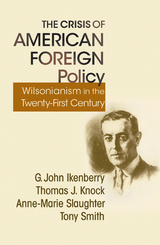Was George W. Bush the true heir of Woodrow Wilson, the architect of liberal internationalism? Was the Iraq War a result of liberal ideas about America's right to promote democracy abroad? In this timely book, four distinguished scholars of American foreign policy discuss the relationship between the ideals of Woodrow Wilson and those of George W. Bush. The Crisis of American Foreign Policy exposes the challenges resulting from Bush's foreign policy and ponders America's place in the international arena. Led by John Ikenberry, one of today's foremost foreign policy thinkers, this provocative collection examines the traditions of liberal internationalism that have dominated American foreign policy since the end of World War II. Tony Smith argues that Bush and the neoconservatives followed Wilson in their commitment to promoting democracy abroad. Thomas Knock and Anne-Marie Slaughter disagree and contend that Wilson focused on the building of a collaborative and rule-centered world order, an idea the Bush administration actively resisted. The authors ask if the United States is still capable of leading a cooperative effort to handle the pressing issues of the new century, or if the country will have to go it alone, pursuing policies without regard to the interests of other governments. Addressing current events in the context of historical policies, this book considers America's position on the global stage and what future directions might be possible for the nation in the post-Bush era. G. John Ikenberry is the Albert G. Milbank Professor of Politics and International Affairs at Princeton University. Thomas J. Knock is associate professor of history at Southern Methodist University. Anne-Marie Slaughter is director of policy planning for the U.S. State Department. Tony Smith is professor of political science at Tufts University. "The Crisis of American Foreign Policy examines Wilson's resonance today. Four noted scholars--three Wilson sympathizers and one caustic critic--offer thoughtful essays on what Wilsons historical example might offer twenty-first-century leaders. . . . It is the combatitive essays by Tony Smith and Anne-Marie Slaughter that invigorate the collection. . . . For Smith, Wilsonianism is a distracting Kantian echo in an increasingly Hobbesian world. Slaughter offers a spirited defense of Woodrow Wilson. . . . This academic clash will resonate with progressives, for Smith's skepticism and Slaughter's optimism reside in many of us. And this same battle of ideas--the pragmatic versus the internationalist--will likely be repeated during high-level debates in the Obama administration."--David Milne, The Nation "This slender volume by fout prominent foreign policy analysts offers a provocative and informative analysis of the impact of Woodrow Wilson's global vision on American foreign policy over the past century and its potential implications for the twenty-first century."--James M. McCormick, Perspectives on Politics "I recommend this book wholeheartedly on a number of levels: it provides an articulate account of Wilsonianism; the opportunity to see a substantive and expertly argued discourse among intellectual heavyweights is very much welcomed; and the added relevance--perhaps--of Slaughter's new position as director of policy planning at the State Department in the new Obama administration means US foreign policy could have a distinct Wilsonian flavour in the run-up to the centenary of Wilson's arrival in the White House."--J. Simon Rofe, International Affairs "Particularly timely. . . . The question the book addresses in four short essays is whether Mr Bush's policies--most notably the Iraq invasion--were 'Wilsonian' in inspiration and whether the reverses have weakened or doomed the tradition."--Daniel Dombey, Financial Times Introduction: Woodrow Wilson, the Bush Administration, and the |
A PLATFORM FOR THOUGHT AND HUMANITY "In generosity and helping others, be like a river. In compassion and grace, be like the sun. In concealing other's faults, be like the night. In anger and fury, be like dead. In modesty and humility, be like the earth. In tolerance, be like the sea. Either appear as you are, or be as you appear" (Mevlana Rumi) "Wisdom is not a product of schooling but of the life-long attempt to acquire it" (Albert Einstein) (Contact Address: reflectioncafe@gmail.com)
Monday, March 07, 2011
Re-visiting US Foreign Policy Doctrines after the Iraq War
Subscribe to:
Post Comments (Atom)


No comments:
Post a Comment